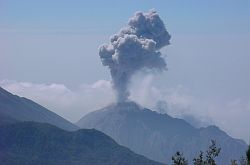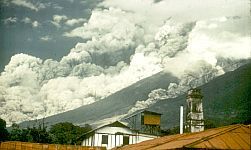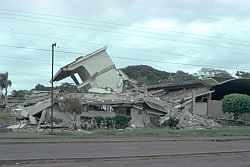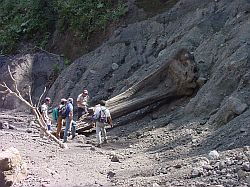| Natural Hazards program development in Geology aided by new support from NSF and US Department of Education |
     |
Michigan Tech’s research and graduate programs in Geological Natural Hazards have secured important new funding from the US National Science Foundation and the Department of Education. A consortium of 6 universities has received funding of about $600,000 to exchange students over the next 4 years and to conduct joint field trips in Canada, Mexico and the US. Michigan Tech is the lead US university and will receive about $200,000 from the US Department of Education to support international travel of US students. The six universities are Michigan Tech and the University at Buffalo in the US; McGill and Waterloo in Canada and UNAM and Colima in Mexico. The funds come from the NAFTA initiative and provide for a multi-university collaborative interdisciplinary effort in Natural Hazards Mitigation. A total of 46 students will spend one or two semesters on a partner campus, while each year there will be a two week joint field exercise for students from all six universities. This program, called EHaz, is the third such consortium funded in geoscience areas at MTU over the past few years. The others have focused on groundwater studies. The National Science Foundation has provided funding of $96,000 to support the first students entering the new Masters International Peace Corps program in Geological Natural Hazards. NSF is interested in the exploratory aspects of this program, first of its kind in geosciences, and wishes to support the initial years when the program is reaching its critical mass. All of the funds will be for assistantships. Sized at about 10 students/year, the new program will eventually have about 30 students in residence. Geological Natural Hazards include all geological or hydrological processes that pose a threat to people or their property. This MS level program aims to address the crosscutting area of Disaster Preparedness and Mitigation by building public awareness and providing technical linkages to schools and communities about Geological Hazards. The program's scope includes earthquakes, volcanic hazards, slope stabilities, landslides, debris flows, droughts and floods and also indirect linkages such as the impact of these events on infra-structural elements like community development, environmental education, transportation, health, sanitation and water quality. The focus of this program is to improve the effectiveness of geological hazards mitigation in appropriate Peace Corps countries. Michigan Tech has already established significant linkage for this work with government agencies in several selected countries, particularly in the areas of volcanic hazards. This program would provide a vehicle for community-level linkages between technical government agencies and people at risk. As Peace Corps Volunteers, MI students would have special training to work on the social and technical aspects of reducing hazards to people . This program is a logical counterpart to Peace Corps' short-term work with Crisis Corps and fits within several sectors where Peace Corps currently works. Details of the new program can be found on the web: www.geohazards.mtu.edu This fall the International Programs branch of NSF is funding travel of 3 MTU faculty and 4 graduate students to South America for a month long trip to do volcanological field work in the Central Andes of Chile and Argentina, to participate in an international volcanological conference in Chile and to help teach a specialized workshop about remote sensing of volcanoes in Argentina. Gregg Bluth, Matt Watson and Bill Rose are the faculty involved and the graduate students are Lizzette Rodriguez and Adam Durant, (Ph D Candidates) and Marika Dalton and Elizabet Head (MS candidates). The trip, which will last all of November, will also be joined by volcanological faculty and students from three other universities in the US (Oregon, Hawaii and Pittsburgh). The field trip will last 12 days (Nov 1-12) and will visit the high Central Andean region near the triple boundary of Bolivia, Argentina and Chile, a volcanic desert mainly greater than 12,000 feet in elevation. It will be done in collaboration with geoscientists at the Universidad de Salta in Argentina and the University of Monash, Australia. The International Association of Volcanology meeting is in Pucon, Chile, south of Santiago (Nov 14-19) and will gather more than 800 volcanologists from all over the world. All of the MTU attendees will present research papers. The workshop, to be held in Cordoba, Argentina Nov 23-27, will be focused on satellite remote sensing of Andean Volcanoes, and is aimed at training South Americans to use this technology to watch their own volcanoes and mitigate hazards. Funding from NSF is $40,000, all in travel funds. The program is described in detail on the web: http://www.geohazards.mtu.edu |
Back To News page
Department of Geological & Mining Engineering & Sciences
Michigan Technological University
1400 Townsend Drive - Houghton, MI 49931-1295
(906) 487-2531
